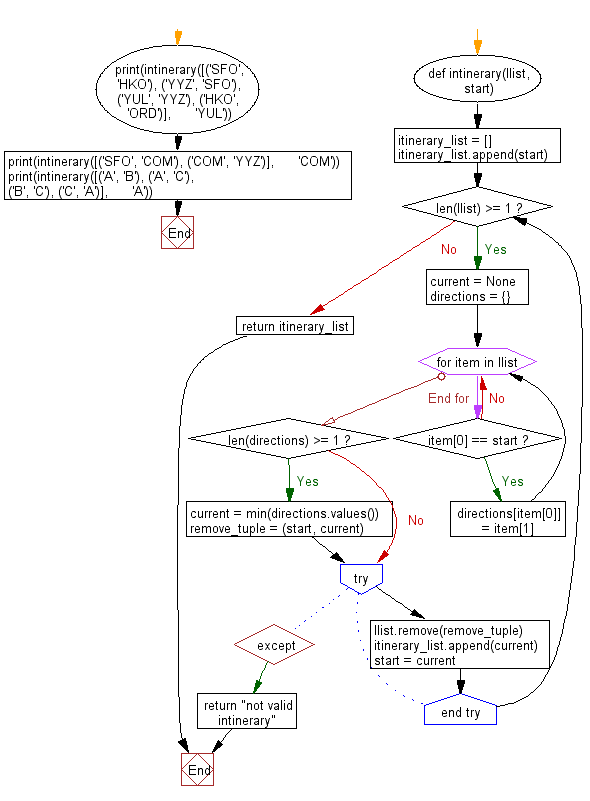Python Challenges: Compute the person's itinerary from a given unordered list of flights
Python Challenges - 1: Exercise-55 with Solution
Given an unordered list of flights taken by someone, each represented as (origin, destination) pairs, and a starting airport.
Write a Python program to compute the person's itinerary. If no such itinerary exists, return null. If there are multiple possible itineraries, return the lexicographically smallest one. All flights must be used in the itinerary.
For example, given the list of flights [('SFO', 'HKO'), ('YYZ', 'SFO'),
('YUL', 'YYZ'), ('HKO', 'ORD')] and starting airport 'YUL', you should
return the list ['YUL', 'YYZ', 'SFO', 'HKO', 'ORD'].
Given the list of flights [('SFO', 'COM'), ('COM', 'YYZ')] and starting
airport 'COM', you should return null.
Given the list of flights [('A', 'B'), ('A', 'C'), ('B', 'C'), ('C', 'A')]
and starting airport 'A', you should return the list ['A', 'B', 'C', 'A', 'C']
even though ['A', 'C', 'A', 'B', 'C'] is also a valid itinerary. However,
the first one is lexicographically smaller.
Sample Solution:
Python Code:
def intinerary(llist, start):
#Ref.https://bit.ly/2Pb67Bk
itinerary_list = []
itinerary_list.append(start)
while len(llist) >= 1:
current = None
directions = {}
for item in llist:
if item[0] == start:
directions[item[0]] = item[1]
if len(directions) >= 1:
current = min(directions.values())
remove_tuple = (start, current)
try:
llist.remove(remove_tuple)
itinerary_list.append(current)
start = current
except:
return "not valid intinerary"
return itinerary_list
print(intinerary([('SFO', 'HKO'), ('YYZ', 'SFO'), ('YUL', 'YYZ'), ('HKO', 'ORD')],
'YUL'))
print(intinerary([('SFO', 'COM'), ('COM', 'YYZ')],
'COM'))
print(intinerary([('A', 'B'), ('A', 'C'), ('B', 'C'), ('C', 'A')],
'A'))
Sample Output:
['YUL', 'YYZ', 'SFO', 'HKO', 'ORD'] not valid intinerary ['A', 'C', 'A', 'B', 'C']
Flowchart:

Python Code Editor:
Contribute your code and comments through Disqus.
Previous: Write a Python program to find the largest palindrome made from the product of two 4-digit numbers.
Next: Write a Python program to print a truth table for an infix logical expression.
What is the difficulty level of this exercise?
Test your Programming skills with w3resource's quiz.
Python: Tips of the Day
Find current directory and file's directory:
To get the full path to the directory a Python file is contained in, write this in that file:
import os dir_path = os.path.dirname(os.path.realpath(__file__))
(Note that the incantation above won't work if you've already used os.chdir() to change your current working directory, since the value of the __file__ constant is relative to the current working directory and is not changed by an os.chdir() call.)
To get the current working directory use
import os cwd = os.getcwd()
Documentation references for the modules, constants and functions used above:
- The os and os.path modules.
- The __file__ constant
- os.path.realpath(path) (returns "the canonical path of the specified filename, eliminating any symbolic links encountered in the path")
- os.path.dirname(path) (returns "the directory name of pathname path")
- os.getcwd() (returns "a string representing the current working directory")
- os.chdir(path) ("change the current working directory to path")
Ref: https://bit.ly/3fy0R6m
- New Content published on w3resource:
- HTML-CSS Practical: Exercises, Practice, Solution
- Java Regular Expression: Exercises, Practice, Solution
- Scala Programming Exercises, Practice, Solution
- Python Itertools exercises
- Python Numpy exercises
- Python GeoPy Package exercises
- Python Pandas exercises
- Python nltk exercises
- Python BeautifulSoup exercises
- Form Template
- Composer - PHP Package Manager
- PHPUnit - PHP Testing
- Laravel - PHP Framework
- Angular - JavaScript Framework
- Vue - JavaScript Framework
- Jest - JavaScript Testing Framework
